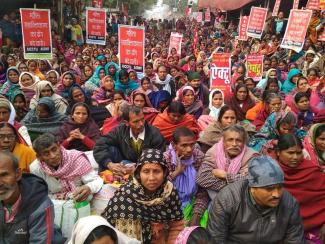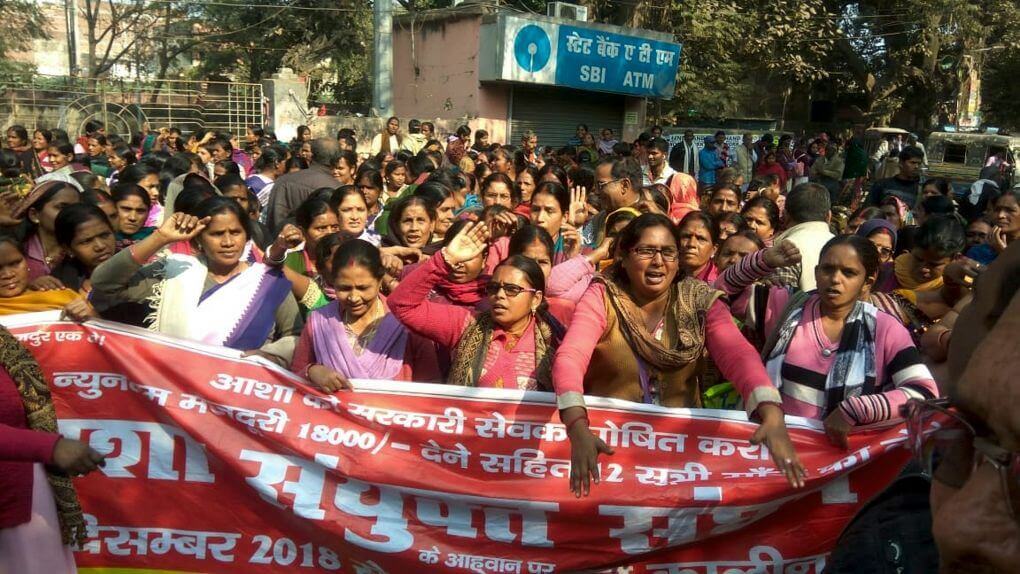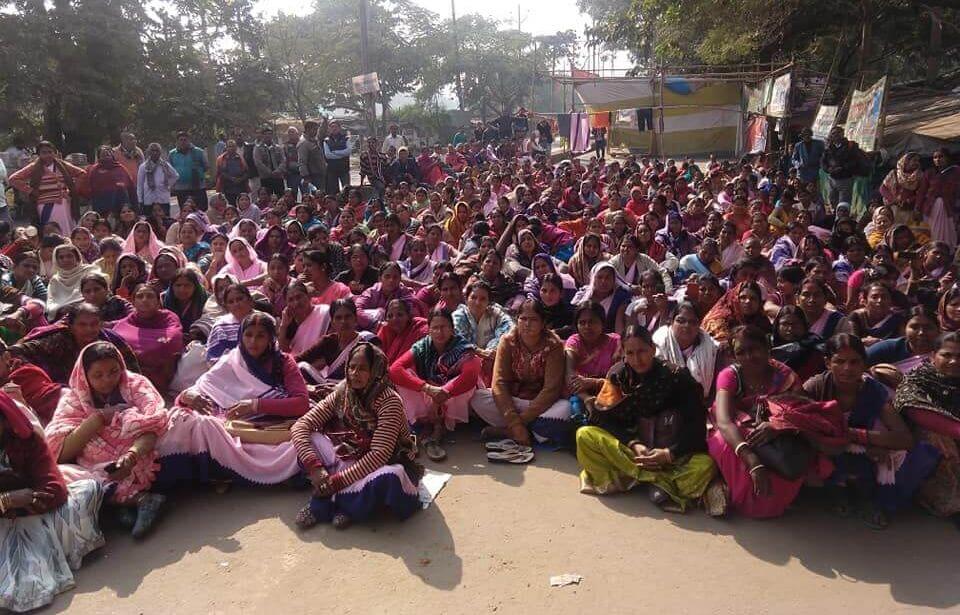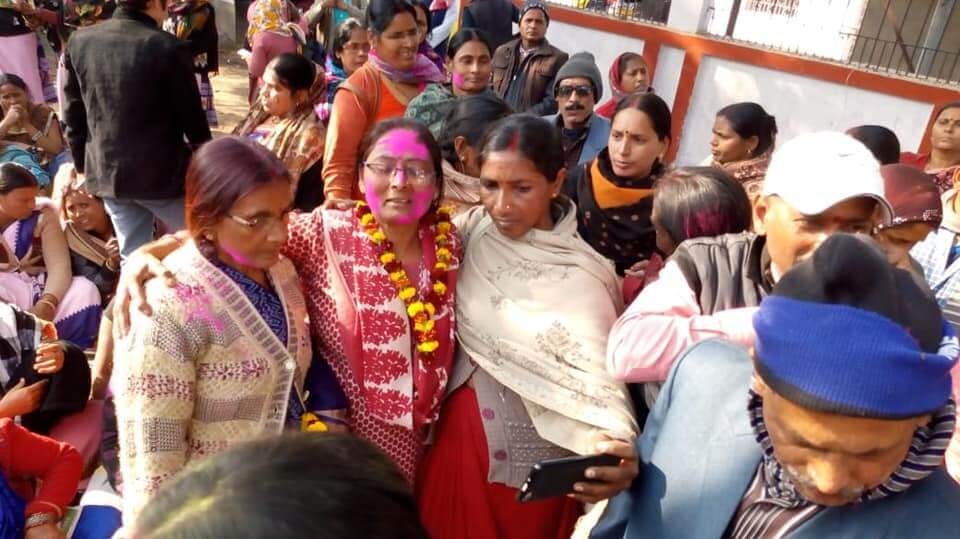
SINCE 7 January, for the past three weeks, more than 2 lakh midday meal cooks have been on indefinite strike in Bihar, demanding a minimum wage and other benefits under social security and labour laws. As we prepare to go to press, they have begun a two-day Mahapadav (massive sit-in) gherao of the Chief Minister’s office in Patna on 23 and 24 January.
The ongoing indefinite strike of mid-day meal cooks, locally known as rasoiya has badly hit the scheme in the government-run schools. As a result, there is no noon meal scheme for hundreds of thousands of children which, in turn, has drastically decreased attendance.
The indefinite strike began under the banner of Bihar Rajya Madhyahn Bhojan Rasoiya Sanyukt Sangarsh Samiti. It is a joint struggle of different federations and associations of mid-day meal workers supported by four trade unions -- All India Central Council of Trade Unions (AICCTU), Centre of Indian Trade Union (CITU), All India Trade Union Congress (AITUC), and All India United Trade Union Centre (AIUTUC).
Most of the MDM cooks and helpers are women, and they are demanding government employee status, and Rs 18,000 monthly wages till the time they are recognised as skilled government employees. They are also demanding that they be paid for the entire year just as school teachers are, instead of for just 10 months of the year. They work from 9 am - 4 pm but the work is still described as ‘part-time’.
Most MDM employees are widows and from the BPL (below poverty line) category, from the oppressed and poorest sections of society. With no minimum wage, no social security, health insurance or pension, they are forever insecure, facing daily insults and threats of being laid off. The intimidation and insults they face are reminiscent of the kind of feudal intimidation women of the same class and communities used to face when they worked as agricultural labour in landlords’ fields. Dignity is no less an important demand than wages. One of the key demands of the Bihar Rasoiya Strike is to stop calling the MDM cooks 'dai' - a term that's unprofessional and reeks of feudal high-handedness.
As with most social reproductive labour, patriarchal ideology is deployed to describe the work of MDM cooks as ‘voluntary’ - a ‘service’ rather than a job. By striking, the MDM cooks are saying that just because they are women whose household labour is unpaid, they cannot be expected to cook unpaid at school!
Scheme workers have not volunteered to work for free - So the Governments needs to stop using the euphemism ‘volunteers’ and recognise them as government employees instead.

Neither the Central Government nor any State Government accepts the scheme workers as Government employees. But Prime Minister Narendrae Modi had recently announced doubling of the “incentive” of ASHA workers and “honorarium” of Anganwadi Sewika-Sahaikas. Even the Bihar had government assured ASHA workers a higher honorarium, after which their month-long strike was called off. So the MDM workers are asking, why isn’t their “honorarium” being increased, at least?
They are also demanding proper kitchens, store rooms, and clean drinking water in the government schools so that hygienic and healthy hot meals can be prepared for school children.
How much are MDM workers paid? The Central Government has not revised the "honorarium" of MDM cooks since 2009. In Bihar, they are paid Rs 1250 per month, Rs 1000 from the Centre and Rs 250 from the State Government. In Rajasthan, the amount is Rs. 1320 only - two big agitations increased the amount from Rs 1000 to Rs 1200 and then the state government increased it by Rs 120. The pay is deducted during summer and winter and Diwali vacations.
In Chhattisgarh, the amount is Rs1200, Rs 1500 in West Bengal, Rs 1000 in UP and Madhya Pradesh, and Rs 1400 in Odisha, Rs 1200 in Telangana. In Gujarat, the Sanchalak (organiser) gets Rs.1600, the cook Rs 1400, and helpers’ honorarium is calculated based on number of children, amounting to Rs 800-1000 per month.
In Kerala, a cook cum-helper part of the MDMS gets a minimum of Rs 400/working day for student strength up to 150. For strength above 150, she is paid 25 paise per child subject to a maximum wage of Rs 475. So on an average the amount each receives is Rs 9000 per month. In Karnataka the main cook gets Rs. 2600 and the the assistant cook Rs.2500. In Tamil Nadu the amount is Rs. 6000.
The fact is that even in those states where the amount is higher, it is far less than the minimum wage and there is no recognition of the workers as government employees entitled to pensions, maternity and other benefits. The 45th and 46th Indian Labour Conference recommended that school cooks should be given the status of workers along with that they should be provided pension, ESI PF and other benefits. Why is the Government shying away from accepting these recommendations?
Instead the Modi Government in 2015 considered replacing hot cooked meals with packed food packets provided by PepsiCo! Harsimrat Kaur Badal, minister for food and processing Industries, met PepsiCo chairperson and CEO Indra Nooyi in this regard. Similar proposals to replace hot cooked meals with “fortified biscuits” were mooted in the UPA’s tenure. Under BJP Governments, eggs - an excellent source of protein and nutrients - have been taken off the school MDM menu.
The importance of the school meal in improving both education standards and nutrition and health indices in rural India cannot be overestimated. The examples of other countries should teach us a lesson. The best example is that of Japan, where every child gets a hot, tasty, well-balanced meal at school, and school lunches are so tasty that parents request for the recipes! A government director of school health education in Japan told the Washington Post in 2013: “Japan’s standpoint is that school lunches are a part of education, not a break from it. What is most difficult for me to explain is why we can do this and other countries cannot.” In large measure due to the school lunch programme, Japan is almost free from poverty-induced malnutrition.
Modi boasts of bringing Japan’s bullet trains to India and turning Varanasi into Kyoto. Why instead does his Government not seek to improve India’s laudable school mid-day meal scheme, already very popular with schoolchildren, to bring it into line with Japan’s hot cooked school meals?

ASHA Workers' Strike Forces Government to Concede Demands
The Bihar ASHA workers’ strike, which began on December 1, 2018, ended on 8 January after the Government conceded certain key demands including a monthly honorarium of Rs 1000 and an enhanced sum of Rs 2000 for routine jobs like maintaining survey registers etc, which ASHA workers in Bihar had not been getting till now.
The Government had refused to negotiate for a month, and had even initiated repressive measures against the ASHAs. When it finally came to the negotiating table, it claimed that it was in no position to give monthly honorarium to ASHA workers, since ASHA workers work as volunteers under a central scheme. But the Government was forced to come to the negotiating table by the determined Strike to agree to an honorarium. After four rounds of talks with the concerned government officials led by the Chief Secretary, Dept. of Health the Health Minister declared in a press conference to accept and implement the 12-point demand charter of ASHA workers. Besides demands of increasing honorarium, ten percent reservation for qualified ASHAs in ANM training schools, provision for appointment of qualified ASHAs on the post of BCMs, to pay all pending dues of ASHA workers in the state by 31 March, to cover ASHAs under various insurance schemes, were also agreed upon. The Government also agreed to prepare an ASHA service guide book, which is an essential mark of their status as Government workers.
The ASHA Joint Struggle Forum held a victory rally on 12 January at Patna.

Liberation Archive
- 2001-2010
-
2011-2020
- 2011
- 2012
- 2013
- 2014
- 2015
- 2016
- 2017
- 2018
-
2019
- JANUARY-2019
-
FEBRUARY-2019
- Republic Day 2019: Rescue India from the Modi Disaster Rebuild Indian Democracy
- 10% EBC Reservation: Expose and Rebuff the Modi Government's Desperate Deflection Tactics
- New Year Begins With New Hope
- Citizenship and Sedition: BJP's Communal And Repressive Agenda
- All India Workers' Strike 2019
- Repression Unleashed On Daikin Workers
- Indefinite Strike by Mid-Day Meal Cooks in Bihar
- The Bhojpur Revolutionaries Fought For Freedom, Equality, Justice And Unity
- 15th Martyrdom Day of Mahendra Singh : Rally Pledges to Defeat BJP, Hoist Red Flag Over Bagodar
- Socialism 2018: People's Need Not Corporate Greed
- A Conversation With A Young MP From Spain's Podemos
- Somyot's Story Affirms The Importance of International Solidarity
- With Trumpets Blazing : Martyrdom Centenary of Rosa Luxemburg and Karl Liebknecht
- SD: Saroj Dutta and his Times
- Mrinal Sen (1923-2018)
- "Universal Basic Income" : The Next 'Jumla'?
- MARCH-2019
- APRIL-2019
- May-2019
- LIBERATION, JUNE 2019
- Liberation JULY 2019
- LIBERATION, August 2019
- Liberation, SEPTEMBER 2019
- Liberation, OCTOBER 2019
- Liberation, NOVEMBER 2019
- Liberation, DECEMBER 2019
- 2020
- 2021-2030
Charu Bhawan, U-90, Shakarpur, Delhi 110092
Phone: +91-11-42785864 | Fax:+91-11-42785864 | +91 9717274961
E-mail: info@cpiml.org







